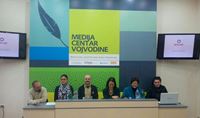Gayten-LGBT – Center for the promotion of LGBTIQ rights, with the help of Labris, organisation for lesbian human rights, held a press conference on Wednesday, December 18th 2013, on the premises of the Independent journalists association of Vojvodina and a round table about the presentation of the Model law on gender identity on the premises of the Assembly of Autonomous Province of Vojvodina in Novi Sad.
Model law on gender identity and the monitoring results of the execution of The Committee of Ministers of the Council of Europe’s recommendations regarding the prohibition of discrimination based on sexual orientation and gender identity.
Model law on gender identity’s aim is the protection of rights and the improvement of the position of trans* people, that is, people whose idea of their gender identity and its expression differ from the common and expected gender binary, and who are since exposed to a high degree of discrimination and violence. It was created in accordance with the recommendations of the leading international organisations, United Nation’s Yogyakarta principles and the Commissioner for Human Rights of the Council of Europe’s recommendations. Apart from it being in accordance with the request for depathologization of trans* identities, it is also in balance with the existing domestic legislation. Model law on gender identity provides trans* identities with the protection from discrimination and practice of rights in fields which are at the moment completely not taken care of legally (the right to change name and sex sign, the right to employment, insurance, marital and family life, health care). The authors of the law are lawyers Slavoljupka Pavlovic, Jelena Simic and Zorica Mrševic, in cooperation with the Gayten-LGBT team.
Gayten-LGBT activists, Milan Duric and Kristian Randelovic, talked about the current position of trans* people in Serbia, as well as triad therapy, while activist and lawyer Slavoljupka Pavlovic and law professor Zorica Mrševic, presented the Model law on gender identity and the analysis of the international legal standards and comparative solutions, which served as the basis for the making of the Model law on gender identity.
Dragana Todorovic from Labris, spoke about the monitoring results of the execution of The Committee of Ministers of the Council of Europe’s recommendations regarding the prohibition of discrimination based on sexual orientation and gender identity, which Labris did during 2012 and 2013, with the help of ILGA Europe (European section of the International association of gay, lesbian, bisexual, trans and intersex people). The report can be viewed here:http://labris.org.rs/novi-sad-labris-predstavio-rezultate-monitoringa-sprovodenja-preporuka-saveta-evrope/
On the same day, on the premises of the Assembly of Autonomous Province of Vojvodina in Novi Sad, a round table about thepresentation of the Model law on gender identity was held. The representatives of relevant institutions and political parties of the Autonomous Province, as well as the ngo sector representatives were present at the round table.
The participants were welcomed by Dragan Bozanic on behalf of the Provincial Secretariat for Economy, Employment and Gender Equality, who stressed that AP Assembly wishes to support the activities directed at the improvement of the position and the protection of the rights of all the citizens, especially those belonging to the marginalised groups.
Milan Duric stressed that the importance of the passing of the law which will protect the rights of trans* people is urgent, as they are in a legal vacuum of sorts at the moment, and he added that trans* people are exposed to an extremely high level of discrimination and violence.
Zorica Mrševic presented the international legal standards and comparative solutions which regulate the positions of trans* people in various countries, and which served as the basis for the making of the Model law.
Danica Todorov, deputy of the Ombudsman for gender equality (AP Vojvodina), spoke about the experience of the institution when it comes to the right to gender expression, and she stressed that the passing of the law is not sufficient. It is also the monitoring of its implementation, since the experience in the implementation of the Law on gender equality has shown that state clerks often rely on obsolete solutions and do not apply the newly passed laws.
Model law on gender identity was presented by Slavoljupka Pavlovic, an activist and a lawyer, and one of the Model law’s authors. Apart from pointing to a need for prompt passing of the law which would regulate trans* rights and protect trans* people from discrimination, Slavoljupka stressed that it is important that the society takes care of all its citizens, especially those marginalised, who are very often invisible from the legal point of view.
The second session was dedicated to practical issues regarding trans* topics. Kristian Randelovic talked about his own experience in working with trans support group, and illustrated steps and difficulties people who decide to enter the process of body modification in order to adjust it to their gender identity are faced with. Jelena Milic Jerkovic talked about many problems and obstacles trans people who are sex workers have, and who are thus exposed to multiple discrimination and violence.
Both sessions were followed by a very active discussion where participants showed readiness to support Model law on gender identity and work together on preparations for its implementation.
Download the Model-law in Serbian here.
